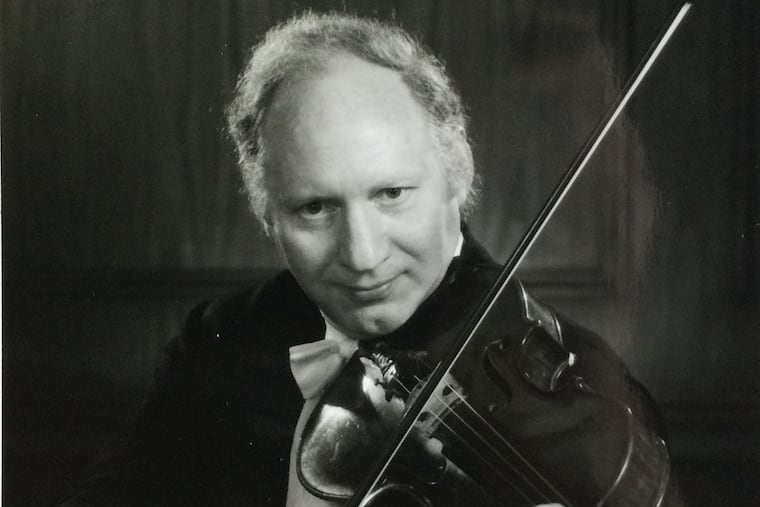Sidney Curtiss, retired assistant principal violist for the Philadelphia Orchestra, music coach, and mentor, has died at 91
Fun-loving, generous, and talented, he inspired music students and entertained audiences for nearly half a century. A reviewer noted his "talkative viola" as a highlight of one performance.

Sidney Curtiss, 91, formerly of Philadelphia, a longtime member of the Philadelphia Orchestra, award-winning music coach at the Settlement Music School, and inspirational mentor, died Wednesday, Aug. 10, of heart failure at Bryn Mawr Hospital.
Known for his “talkative viola” and “contagious love for music,” Mr. Curtiss played with conductors Eugene Ormandy, Riccardo Muti, and Wolfgang Sawallisch, and the rest of the acclaimed Philadelphia Orchestra for 42 years, 13 as its assistant principal viola.
He also played for the New Orleans Symphony Orchestra, National Symphony Orchestra, Philadelphia Chamber Ensemble, Philarte Quartet, New Philadelphia Quartet, Music Society of South Jersey, Allegro Society Orchestra, and other groups.
Even though he sometimes played to as few as 400 people, his solo performances at smaller venues in South Jersey had special significance for Mr. Curtiss. “It’s not like going into the orchestra and playing Beethoven or Brahms,” he told The Inquirer in 1990. “It’s gratifying for me to play a solo because I rarely do it.”
In music reviews for The Inquirer, Peter Dobrin in 1991 said Mr. Curtiss’ viola was “impressive individually” in Dvorak’s Quintet in A major, and Lesley Valdes said a performance of Vivaldi’s Concerto in G minor “was further enlivened by Sidney Curtiss’ talkative viola.”
Inquirer music critic Daniel Webster said in 1993 that “violist Sidney Curtiss set the mood and tone of the work in the florid solo” in a performance of Enesco’s Romanian Rhapsody No. 1.
Mr. Curtiss was a popular faculty member for four decades at Settlement, focusing in advanced study string quartets, and became a sought-after chamber music coach there after his retirement from the orchestra in 2002. He won the 2009 Sol Schoenbach Award for outstanding service to Settlement, earned coaching honors at national chamber music competitions, and his students went on to play for orchestras in Philadelphia, Detroit, Houston, Toronto, Pittsburgh, and elsewhere.
He was also a chamber music coach for the Center for Gifted Young Musicians at Temple University and other schools.
“I can still hear him pleading for me to vibrate every note, to listen to my colleagues, to prepare better, and to stop rushing,” former Settlement student and fellow Philadelphia Orchestra member Kerri Ryan, now a coach at Settlement, said in a tribute.
Other colleagues at Settlement said in a tribute: “Sid’s musical impact will continue to echo throughout our recital halls and in our chamber music studios.”
In 1995, on one of his many visits to local high schools, Mr. Curtiss and other musicians met with the Washington Township High School orchestra, and he told The Inquirer why he embraced such educational sessions. “It’s the kind of lesson that’s usually only available in the best conservatories,” he said. “It’s important to get another approach so you don’t get set in one teacher’s ways.”
Born March 23, 1931, in the Bronx, Mr. Curtiss studied violin and viola at New York’s High School of Music and Art and later worked with Leonard Mogill at the Philadelphia Conservatory of Music, now the College of Performing Arts of the University of the Arts. He was drafted into the Army in 1950, served until 1954, and played bass drum in the military band because violas weren’t required.
He met bassoonist Shirley Vineyard through musical friends, and they married in 1962. Together, they taught at Settlement and lived on Spruce Street in Center City until her death in 2019. Over the years, they traveled the world, threw memorable holiday parties, served up delectable dinners, and shared their eclectic lifestyle with family and friends.
Beth Rusk, Mr. Curtiss’ niece, called them her “exotic” relatives. “They created a wonderful world of music, theater, and history,” she said.
Mr. Curtiss doted on his Airedale Terriers, played chess often, and liked to fish and sail on Lake Luzerne in New York. He was a wine connoisseur, and his mouthwatering beef stew, salmon mousse, and tarte Tatin were legendary. He moved to the Quadrangle in Haverford after his wife’s death.
Robyn Bollinger, a former student of Mr. Curtiss at Settlement and the concertmaster for the Detroit Symphony Orchestra, said: “He was my pseudo-grandfather, a brilliant chef, a beautiful musician, a passionate teacher, an emotional cheerleader, an ardent dog lover, and a great friend to so many.”
“He was,” said his cousin, Steven Bosan, “a wonderful guy.”
In addition to his cousin and niece, Mr. Curtiss is survived by other relatives. A sister died earlier.
A musical celebration of the lives of Sid and Shirley Curtiss is scheduled for 5 p.m., Nov. 27, at the Mary Louise Curtis branch of the Settlement Music School, 416 Queen St., Philadelphia, Pa. 19147. A reception is to follow.
Donations in their names may be made to Settlement Music School, PO Box 63966, Philadelphia, Pa. 19147.